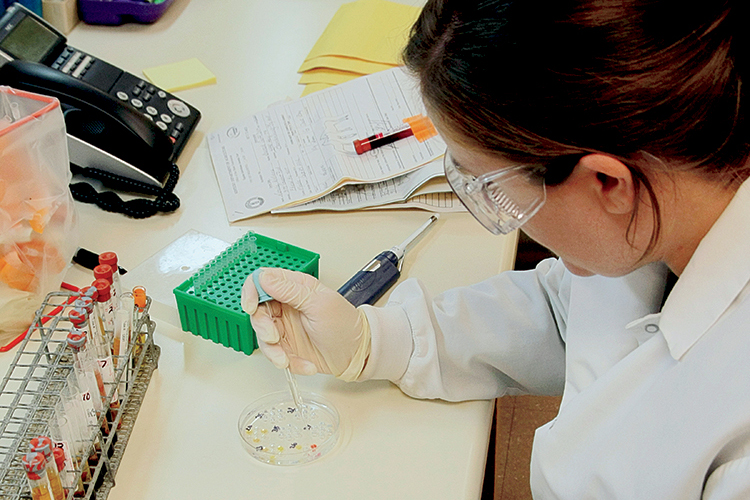Home > Kentucky > Kentucky Ag Education > Kentucky Vets are Acing the Test
Kentucky Vets are Acing the Test

The next time you enjoy a flavorful steak or a delicious chicken breast, the cook isn’t the only one you should thank. Kentucky’s veterinary diagnostic laboratories also play an important role in ensuring a safe food supply for the region.
These labs are a critical part of the infrastructure that stands behind Kentucky’s agriculture industry. The University of Kentucky Veterinary Diagnostic Laboratory in Lexington and the Breathitt Veterinary Center (BVC) in Hopkinsville, affiliated with Murray State University (MSU), foster public health by protecting animal health.
Dr. Wade Northington, programs manager of the BVC, explains the work as “animal disease surveillance” through a wide scope of diagnostic services. The BVC, like the UK lab, performs tests to investigate the nature of disease, determine the threat it poses, monitor its movement and help eliminate it.
“Agriculture contributes over $6 billion to Kentucky’s economy, with more than 60 percent originating from livestock and poultry,” Northington says. “So it’s very important for us to keep our finger on the pulse of what’s happening with the animals and respond quickly.”
Dr. Deborah Maples, the diagnostic services coordinator at the UK lab, agrees. She views her 60 coworkers as “sentinels standing guard to detect disease and problems.” It’s a job that takes a lot of scientific skill in areas like pathology, microbiology and toxicology. Veterinarians, producers and the public are all clients.

Big Job, Big Support
Between the two labs, nearly 700,000 tests are performed each year. That may be as simple as testing the blood of a chicken or as challenging as performing a necropsy (or autopsy) of a cow.
Both labs offer additional services to promote overall health and in some cases to foster the animal-human bond. The UK lab, for instance, oversees disease surveillance of horses, pets and even zoo animals. The BVC provides instruction for MSU’s four-year animal health technology program and pre-veterinary curriculum, and supports undergraduate and graduate-level research projects.
It’s a big job to provide these important services, and both labs have some big support to get that job done. Nearly five years ago, the 30-year-old UK lab was renovated, doubling its square footage and updating its equipment.
Recently, the state appropriated $32.4 million to construct a new 53,000-square-foot BVC to replace the current facility, which was built in 1968. The new lab should be complete in mid-2016.
“Agriculture is and will continue to be Kentucky’s foremost economic engine,” Northington says. “The new BVC facility will allow for increased public value by further expanding into areas impacting agriculture such as water quality, milk quality, food safety and environmental safety.”
Both labs are committed to doing the work that keeps Kentucky’s animal ag industry strong and viable. “When you safeguard the health of the animal population, you’re keeping the people of the Commonwealth healthy, too,” Maples says. “We take great pride in being able to make a difference in our region’s health.”



